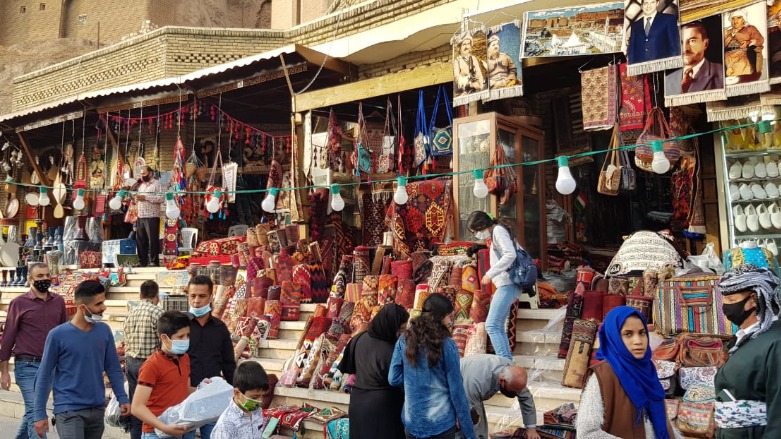Businesses in historic Erbil bazaar feel impact of economic downturn amid COVID-19 pandemic

ERBIL (Kurdistan 24) – Shopkeepers in the historic bazaar of the Kurdistan Region’s capital say their businesses have taken a hit due to delayed salaries for public employees, the dire economic situation, and the COVID-19 pandemic.
Hidayet Sheikhani, 38, who sells traditional Kurdish scarves in the bazaar near the Erbil Citadel, began selling facemasks made from traditional Kurdish scarves to keep his business afloat during the pandemic.

Following alarming surges in new COVID-19 cases, the Kurdistan Regional Government (KRG) has recently mandated that facemasks be worn in public, with a fine of 20,000 Iraqi dinars (about $16) for those who fail to comply.
Despite this, facemask usage in public is not widespread.
“The mask is necessary to protect you from the coronavirus; this virus kills people, and we have to protect ourselves from this pandemic and I pray to God that this coronavirus will go away. We have to go through it,” Sheikhani said.
“We have fewer customers now, and people try to protect themselves by staying home. But at the same time, people feel suffocated by staying home, so people try to protect themselves when they go out.”

The new Kurdish-style facemasks are popular, he says. “They are made from the Jamadani (traditional Kurdish scarf). It’s completely Kurdish-made.”
However, Baxtiyar Mama Samir, 35, who sells traditional scarves too, adds that the lack of visitors to the bazaar is not only caused by the coronavirus.
“It's also because of the delay of (public) salaries. People have no money. We hope all these things will be fixed.”

In late April, Baghdad froze monthly payments to Erbil of its budget share that was being used for government salaries. Primary among ongoing disputes is the federal government’s transfer of the KRG’s share of the national budget and Erbil’s handover of 250,000 barrels of oil per day to Iraqi state oil marketer SOMO, as outlined in an agreement between the two sides that was renewed in late 2019 but never implemented.
Iraq’s economy, including that of the Kurdistan Region, has further suffered from an economic crisis due to the coronavirus pandemic and the resulting drop in oil prices.
While the KRG has an estimated $27 billion in debt, Baghdad has debts of around $22.5 billion.
Now locals fear that the Kurdistan Region’s economy will be affected further after the Iraqi parliament on Thursday passed a fiscal deficit law that Kurdish lawmakers abandoned.

On Sunday, Kurdistan Region President Nechirvan Barzani called the passage of the bill an attempt to “punish” the citizens of the autonomous region.
Read More: KRG objects to spending bill Iraq passed in absence of Kurdish lawmakers
Ali Jamal, a shopkeeper who sells various household items, told Kurdistan 24 that Iraq's economic and political situation is unstable. “There are not many tourists; it's almost winter, and schools are about to reopen.”
“Some are afraid of the COVID-19 crisis; some aren’t. The situation is so bad; if the salaries were paid, it would be good. If salaries don't get paid, the situation will worsen.”
Nawzad Ali, 40, who owns a souvenir shop, also says there are fewer customers because of the lack of public salaries in Iraq and COVID-19. He explained that despite the increased market activity on Fridays, including spending by Iraqi tourists, “there is less money” overall.
Brwa Aziz, 28, who sells souvenirs and carpets with the images of Kurdish leaders, says there have been several delays in salaries. “People are just coming to look around; they don't buy anything,” he said. “I didn’t sell anything today.”

However, some shopkeepers are hopeful that the economic situation will improve, and COVID-19 will go away.
“I know it's a temporary situation. If we have difficulties, we have to stand and get through it. Kurds are used to it, we have seen many difficulties, but we also saw a lot of happiness.”
“We have seen situations more difficult than now,” Baxtiyar Mama Samir concluded.
Editing by Khrush Najari
